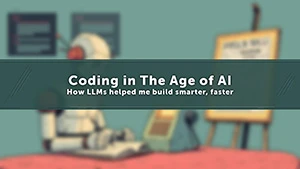
Image credit: Original image
Originally appeared in LinkedIn Future Singularity
As someone living with ADHD, anxiety, and depression, I have a personal appreciation for the potential role artificial intelligence (AI) could play in supporting mental health care. However, because of my interactions with artificial intelligence language models such as Claude, Gemini, and ChatGPT, I approach the subject cautiously. Even while these are great technological achievements, it's important to keep in mind that they are artificial intelligence systems that have been trained on large datasets; they don’t possess the same level of subject-matter expertise as a human expert might. There are legitimate concerns that the very human-like responses from advanced language models could lead people to put too much stock in their outputs, treating them as authoritative facts rather than generated approximations.
AI is transforming industry after industry, and mental health care is no exception. From diagnosing conditions to delivering therapy, AI is starting to play an increasingly prominent role in supporting mental wellness. While AI won't replace human therapists and psychologists anytime soon, it offers powerful tools to enhance care and make mental health services more accessible and effective. Let's explore some of the ways that AI is impacting the mental health field.
One of the biggest challenges in mental health is accurately diagnosing conditions from a complex set of symptoms that can overlap across multiple disorders. AI excels at finding patterns in large datasets, making it an invaluable aid for psychiatric diagnosis. Machine learning models can analyze a patient's symptoms, history, brain imaging and other data to increase diagnostic accuracy.
For example, a 2018 study found that a machine learning model could distinguish between healthy individuals and those with psychiatric disorders with 85% accuracy based solely on functional MRI brain scans1. AI has also shown promise in predicting which treatments a patient will respond to best based on their specific symptoms and brain activity patterns.
By enhancing diagnosis and treatment planning, AI could help get patients on the right therapy path sooner and reduce time spent cycling through ineffective treatments. However, AI diagnosis is still an emerging field and human expertise remains essential for final clinical decisions.
Access to Therapy
Due to provider shortages, high costs, transportation constraints, and other factors, millions of people do not have access to high-quality, reasonably priced mental health care. Chatbots, digital therapists, and AI-powered apps are expanding the reach and scalability of therapeutic support.
For instance, Woebot, an AI chatbot, uses just conversational interactions to provide cognitive behavioral therapy (CBT). A clinical investigation2 found that using Woebot led to significant reductions in depression and anxiety for students after 2 weeks compared to an information control group. Digital therapists can offer an "always there" source of support and evidence-based activities on a large scale, but they cannot completely substitute human clinicians for difficult patients.
Some startups are using avatars and animations to build relatable virtual therapists that provide pre-scripted CBT sessions. While these algorithms' emotional intelligence is currently limited, they capitalize on people's natural tendency to open up to digital humans, which may help overcome the stigma associated with seeking support.
Monitoring and Early Intervention
While AI analysis of smartphone and wearable data is well suited for this task, caregivers find it difficult to continuously monitor a patient's mental state remotely. An app might use voice biomarkers, sleep patterns, messaging habits, and other passively gathered data to identify symptoms of anxiety or depression. After that, it might provide users with psychoeducational materials or make an appointment during a window of opportunity for intervention, preventing the situation from getting worse.
AI is also being investigated for the prevention of suicide by keeping an eye out for acute risk indicators in texts, social media, and other digital trails3. The AI might put a person in contact with emergency personnel or a human counselor in a crisis. Despite legitimate privacy concerns, these applications have the potential to save lives by providing early and effective mental health care.
Supporting Therapy Delivery
While AI won't match the emotional intelligence of human therapists anytime soon, it is augmenting their abilities in several ways, like automating routine tasks, think documentation and assessment scoring, to free up therapists for higher-value activities. Or perhaps analyzing video sessions to identify emotional states, speech patterns and behavior markers that a human reviewer may miss.
We can also consider the ability of AI to recommend personalized therapeutic exercises, skill practice drills and psychoeducation content for between-session work. Resulting in the delivery of standardized therapies like CBT with perfect fidelity. This would allow human providers to focus on more complex cases.
All of these AI-powered enhancements aim to make human therapists more efficient, effective and consistent in their care delivery.
Risks of Overreliance on AI
While AI offers many potential benefits for mental health care, we also need to be cautious about its limitations and consider possible negative consequences from over-reliance on AI systems.
AI chatbots and digital therapists are accessible and scalable, yet they cannot fully match the empathy, emotional attunement, and rapport-building seen in human therapy connections. Individuals suffering from isolation, loneliness, or attachment disorders may find that an overreliance on AI interactions, if not balanced with human connection, exacerbates their problems.
Many experts are concerned that the use of social media, especially among young people, is exacerbating the mental health problem due to its addictive AI recommendation algorithms. When used excessively, idealized self-representations, social comparison, and unpleasant or insulting interactions on these platforms have been connected to sadness, anxiety, and low self-esteem.
As AI systems gain deeper insights into the way we think, our emotions, and mental health vulnerabilities through chat logs and data collection, we need strong governance to protect this highly personal information from misuse, hacking or exploitation, which could potentially cause psychological harm.
It’s interesting to consider (and not too much of a stretch) that an over-reliance on AI technologies that automate elements of the treatment process may result in deskilling or overconfidence in the capabilities of AI, as human therapists lapse in the development and maintenance of important clinical competences. Begging the question once again of how can we ensure that AI is used to supplement, rather than replace human skills?
While we’re seeing that amazing advancements in mental health are being made possible through the use of AI, we still need to exercise caution when and how we interact with technology in comparison to human doctors and support networks. AI can surely be a useful tool when used responsibly and in moderation, but no AI system can fully replace the depth of therapeutic interactions between humans.
Challenges and Limitations
For all its potential, the use of AI in mental health is still in relatively early stages. Key challenges that need to be addressed include are underlined by privacy and security. We have to ensure that personal health data and intimate conversation details remain encrypted and protected as AI systems gain deeper access to this highly sensitive information.
Another concern carries on the safety and ethical discussion. AI systems that are designed to assess individuals on the potential for self-harm need robust safeguards and human oversight. Over-reliance on "black box" AI systems for life-impacting decisions should be avoided. Not to overlook the obvious, but just like humans, AI can exhibit concerning biases if trained on skewed or biased data. Thorough testing is required to validate any AI-based mental health solutions before widespread deployment can even be considered.
As AI continues to advance, we need to determine the right balance of AI autonomy versus human control based on use case. A failure would be allowing AI systems to discourage people from seeking human care or to overrule human expertise inappropriately. An outcome that we should focus on avoiding. Ideally, AI's role in mental health will be that of an enabler and supportive tool for human providers rather than an outright replacement. Used responsibly, AI could help alleviate the mental health crisis by broadening access to high-quality, data-driven, personalized care.
Conclusion
AI has the ability to significantly improve mental health services, but perhaps also have a profound impact on users’ mental health. While AI can lessen stigma, monitor progress, develop individualized treatment programs, offer support, and aid in early identification. Concerns about privacy, accuracy, dependability, the absence of human touch, accessibility issues, and ethical issues are some of the many perceived difficulties.
As we continue to develop and apply AI in mental health treatment, it's critical to keep these challenges in mind. By doing this, we can guarantee that AI serves the greatest number of people in the most effective manner.
References
- Peter, F., Andrea, S., & Nancy, A. (2018). Forty years of structural brain imaging in mental disorders: is it clinically useful or not?. Dialogues in clinical neuroscience, 20(3), 179–186. – URL: https://www.ncbi.nlm.nih.gov/pmc/articles/PMC6296397/, doi: 10.31887/DCNS.2018.20.3/pfalkai
- Fitzpatrick KK, Darcy A, Vierhile M. Delivering cognitive behavior therapy to young adults with symptoms of depression and anxiety using a fully automated conversational agent (Woebot): a randomized controlled trial. JMIR Ment Health 2017 Jun 06;4(2):e19 - URL: https://mental.jmir.org/2017/2/e19, doi: 10.2196/mental.7785
- CALVO RA, MILNE DN, HUSSAIN MS, CHRISTENSEN H. Natural language processing in mental health applications using non-clinical texts. Natural Language Engineering. 2017;23(5):649-685. URL: https://www.cambridge.org/core/journals/natural-language-engineering/article/[...] doi:10.1017/S1351324916000383
- Ettman C, Galea S. The Potential Influence of AI on Population Mental Health. JMIR Ment Health 2023;10:e49936 - URL: https://mental.jmir.org/2023/1/e49936, doi: 10.2196/49936
Further Reading
For those interested in learning more about the role of AI in mental health, here are some useful resources:
By exploring these resources, you can gain a deeper understanding of how AI is changing the field of mental health and the challenges that come with it.


